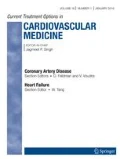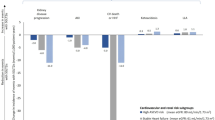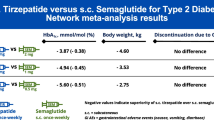Opinion statement
The increased risk of heart failure hospitalizations related to treatment with the DPP-4 inhibitor saxagliptin observed in the SAVOR TIMI 53 trial, is likely not to be a chance effect, but rather a previously unrecognized side effect of this drug, as this risk was very consistently apparent across all subgroups of this large multicenter, prospective, randomized trial. Whether this side effect might represent a class effect of all DPP-4 inhibitors remains to be seen. Results of randomized prospective multicenter trials with the DPP-4 inhibitors alogliptin and vildagliptin have in fact generated new uncertainties and clearly not totally excluded the possibility of a class side effect. A meta-analysis of 59 randomized controlled trials with various DPP-4 inhibitors evaluating data from 36,620 patients with diabetes and a minimal observation period of 24 weeks, confirmed a 21 % increase of heart failure events compared to placebo treatment, however, not in comparison to treatment with other blood glucose lowering drugs. German registry data also did not show an increased risk for heart failure for the latter comparison. Potential interactions of DPP-4 inhibitors with other drugs, e.g. ACE inhibitors, have been discussed in relation to the increased heart failure risk, as well as interactions with peptides regulating cardiovascular functions that are also split by DPP-4 enzymes such as BNP, substance P, and NPY. Results from ongoing large multicenter trials with the DPP-4 inhibitors sitagliptin and linagliptin are expected to clarify the potential heart failure issue related to treatment with DPP-4 inhibitors.
Similar content being viewed by others
References
Papers of particular interest, published recently, have been highlighted as: • Of importance •• Of major importance
Standl E, Schnell O. A new look at the heart in diabetes mellitus: from ailing to failing. Diabetologia. 2000;43(12):1455–69.
Ryden L, Standl E, Bartnik M, Van den Berghe G, Betteridge J, de Boer MJ, et al. Guidelines on diabetes, pre-diabetes, and cardiovascular diseases: executive summary. The Task Force on Diabetes and Cardiovascular Diseases of the European Society of Cardiology (ESC) and of the European Association for the Study of Diabetes (EASD). Eur Heart J. 2007;28(1):88–136. doi:10.1093/eurheartj/ehl260.
Ryden L, Grant PJ, Anker SD, Berne C, Cosentino F, Danchin N, et al. ESC Guidelines on diabetes, pre-diabetes, and cardiovascular diseases developed in collaboration with the EASD: the Task Force on diabetes, pre-diabetes, and cardiovascular diseases of the European Society of Cardiology (ESC) and developed in collaboration with the European Association for the Study of Diabetes (EASD). Eur Heart J. 2013;34(39):3035–87. doi:10.1093/eurheartj/eht108. Most recently updated comprehensive guideline on heart failure & diabetes mellitus.
McMurray JJ, Gerstein HC, Holman RR, Pfeffer MA. Heart failure: a cardiovascular outcome in diabetes that can no longer be ignored. Early online. Lancet Diabetes Endocrinol. 2014. doi:10.1016/S2213-8587(14)70031-2.
Nissen SE, Wolski K, Topol EJ. Effect of muraglitazar on death and major adverse cardiovascular events in patients with type 2 diabetes mellitus. JAMA. 2005;294(20):2581–6. doi:10.1001/jama.294.20.joc50147.
Center for Drug Evaluation and Research. Guidance for industry diabetes mellitus: evaluating cardiovascular risk in new antidiabetic therapies to treat type 2 diabetes. 2008. Available at http://www.fda.gov/downloads/Drugs/GuidanceComplianceRegulatoryInformation/Guidances/ucm071627.pdf (accessed May 1, 2014).
Nissen SE, Wolski K. Effect of rosiglitazone on the risk of myocardial infarction and death from cardiovascular causes. N Engl J Med. 2007;356(24):2457–71. doi:10.1056/NEJMoa072761.
Kahn SE, Haffner SM, Heise MA, Herman WH, Holman RR, Jones NP, et al. Glycemic durability of rosiglitazone, metformin, or glyburide monotherapy. N Engl J Med. 2006;355(23):2427–43. doi:10.1056/NEJMoa066224.
Home PD, Pocock SJ, Beck-Nielsen H, Curtis PS, Gomis R, Hanefeld M, et al. Rosiglitazone evaluated for cardiovascular outcomes in oral agent combination therapy for type 2 diabetes (RECORD): a multicentre, randomised, open-label trial. Lancet. 2009;373(9681):2125–35. doi:10.1016/S0140-6736(09)60953-3.
Dormandy JA, Charbonnel B, Eckland DJ, Erdmann E, Massi-Benedetti M, Moules IK, et al. Secondary prevention of macrovascular events in patients with type 2 diabetes in the PROactive Study (PROspective pioglitAzone Clinical Trial In macroVascular Events): a randomised controlled trial. Lancet. 2005;366(9493):1279–89. doi:10.1016/S0140-6736(05)67528-9.
Erdmann E, Charbonnel B, Wilcox RG, Skene AM, Massi-Benedetti M, Yates J, et al. Pioglitazone use and heart failure in patients with type 2 diabetes and preexisting cardiovascular disease: data from the PROactive study (PROactive 08). Diabetes Care. 2007;30(11):2773–8. doi:10.2337/dc07-0717.
Lincoff AM, Tardif JC, Schwartz GG, Nicholls SJ, Rydén L, Neal B, et al. Effect of Aleglitazar on Cardiovascular Outcomes After Acute Coronary Syndrome in Patients With Type 2 Diabetes Mellitus. The AleCardio Randomized Clinical Trial. JAMA. 2014;311(15):1515–25.
Scirica BM, Bhatt DL, Braunwald E, Steg PG, Davidson J, Hirshberg B, et al. Saxagliptin and cardiovascular outcomes in patients with type 2 diabetes mellitus. N Engl J Med. 2013;369(14):1317–26. doi:10.1056/NEJMoa1307684. Detailed information on fully published randomized controlled trials on DPP4 inhibitors and heart failure.
White WB, Cannon CP, Heller SR, Nissen SE, Bergenstal RM, Bakris GL, et al. Alogliptin after acute coronary syndrome in patients with type 2 diabetes. N Engl J Med. 2013;369(14):1327–35. doi:10.1056/NEJMoa1305889.
Standl E. Saxagliptin, alogliptin, and cardiovascular outcomes. N Engl J Med. 2014;370(5):483. 10.1056/NEJMc1313880#SA1. Detailed information on fully published randomized controlled trials on DPP4 inhibitors and heart failure.
McMurray J. The Vildagliptin in Ventricular Dysfunction Diabetes (VIVIDD) trial. Presented at the Heart Failure Congress 2013, Lissabon, Portugal. 2013;99. abstract.
Nainggolan L. Heart-failure data for alogliptin prompt more debate at ACC. Medscape. March 31, 2014. Available at http://www.medscape.com/viewarticle/822849 (accessed 14-05-05).
Ussher JR, Drucker DJ. Cardiovascular biology of the incretin system. Endocr Rev. 2012;33(2):187–215. doi:10.1210/er.2011-1052.
Parker SL, Balasubramaniam A. Neuropeptide Y Y2 receptor in health and disease. Br J Pharmacol. 2008;153(3):420–31. doi:10.1038/sj.bjp.0707445.
Fadini GP, Avogaro A. Cardiovascular effects of DPP-4 inhibition: beyond GLP-1. Vasc Pharmacol. 2011;55(1–3):10–6. doi:10.1016/j.vph.2011.05.001.
Marney A, Kunchakarra S, Byrne L, Brown NJ. Interactive hemodynamic effects of dipeptidyl peptidase-IV inhibition and angiotensin-converting enzyme inhibition in humans. Hypertension. 2010;56(4):728–33. doi:10.1161/HYPERTENSIONAHA.110.156554.
Jackson EK, Dubinion JH, Mi Z. Effects of dipeptidyl peptidase iv inhibition on arterial blood pressure. Clin Exp Pharmacol Physiol. 2008;35(1):29–34. doi:10.1111/j.1440-1681.2007.04737.x.
Jackson EK, Mi Z. Sitagliptin augments sympathetic enhancement of the renovascular effects of angiotensin II in genetic hypertension. Hypertension. 2008;51(6):1637–42. doi:10.1161/HYPERTENSIONAHA.108.112532.
Boschmann M, Engeli S, Dobberstein K, Budziarek P, Strauss A, Boehnke J, et al. Dipeptidyl-peptidase-IV inhibition augments postprandial lipid mobilization and oxidation in type 2 diabetic patients. J Clin Endocrinol Metab. 2009;94(3):846–52. doi:10.1210/jc.2008-1400.
Vildagliptin. Arznei-Telegramm 2008; Jg. 39, Nr. 6, 66–67.
Krum H, Skiba M, Wu S, Hopper I. Heart failure and dipeptidyl peptidase-4 inhibitors. Eur J Heart Fail. 2014. doi:10.1002/ejhf.90.
Gitt AK, Bramlage P, Binz C, Krekler M, Deeg E, Tschope D. Prognostic implications of DPP-4 inhibitor vs. sulfonylurea use on top of metformin in a real world setting - results of the 1 year follow-up of the prospective DiaRegis registry. Int J Clin Pract. 2013;67(10):1005–14.
Naingolan L. Conflicting data on sitagliptin and heart failure in diabetes. Medscape 2014, July 1. Available at http://www.medscape.com/viewarticle/827653 (accessed 14-07-02).
Green JB, Bethel MA, Paul SK, Ring A, Kaufman KD, Shapiro DR, et al. Rationale, design, and organization of a randomized, controlled Trial Evaluating Cardiovascular Outcomes with Sitagliptin (TECOS) in patients with type 2 diabetes and established cardiovascular disease. Am Heart J. 2013;166(6):983–9 e7. doi:10.1016/j.ahj.2013.09.003.
CAROLINA: Cardiovascular Outcome Study of Linagliptin Versus Glimepiride in Patients With Type 2 Diabetes. ClinicalTrials.gov Identifier: NCT01243424 (accessed May 1, 2014)
Acknowledgments
This activity was supported by an Educational Grant of the Association for the Support of International Scientific Communication in Diabetology e.V., Munich, Germany
Compliance with Ethics Guidelines
Conflict of Interest
Dr. Eberhard Standl, Dr. Michael Erbach, and Dr. Oliver Schnell each declare no potential conflicts of interest.
Human and Animal Rights and Informed Consent
This article does not contain any studies with human or animal subjects performed by any of the authors.
Author information
Authors and Affiliations
Corresponding author
Additional information
This article is part of the Topical Collection on Prevention
Rights and permissions
About this article
Cite this article
Standl, E., Erbach, M. & Schnell, O. Dipeptidyl-peptidase-4 Inhibitors and Heart Failure: Class Effect, Substance-Specific Effect, or Chance Effect?. Curr Treat Options Cardio Med 16, 353 (2014). https://doi.org/10.1007/s11936-014-0353-y
Published:
DOI: https://doi.org/10.1007/s11936-014-0353-y




